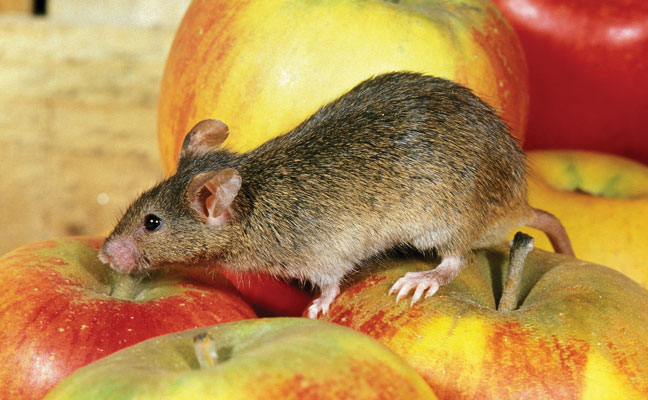- Neophobia may be becoming a behavioral trait.
- Pre-baiting traps may produce better results.

This adult house mouse is looking for the perfect apple for lunch. PHOTO: SLOWMOTIONGLI/ISTOCK / GETTY IMAGES PLUS/GETTY IMAGES
Have you had more trouble than usual with house mice (Mus musculus)? Have you had mouse problems seemingly arise without warning? Are you placing traps that yield mediocre results? It has been coming for a while in parts of the country, but it may be showing up at your door.
If we see mouse behavior change, our own behavior will need to change accordingly. Traps are an important part of mouse control, but if they won’t serve as our first evidence of activity, we’ll need to put more emphasis on inspection.
I know, I know — I hear you out there saying “We always inspect in addition to servicing traps,” but there are still some who simply watch the traps for the first evidence of activity. It may be time to dust off the ol’ flashlight and spend more time inspecting for droppings, rub marks (that’s sebum, for you intellectuals out there), gnaw marks and obvious entry points.
Why is it happening?
Why mice are behaving this way is largely academic. A reasonable explanation would be that, after decades of trapping mice, those that exhibit trap-shyness live to reproduce more often. It’s a basic behavior in rats, known as neophobia, or fear of the new.
This might be considered behavioral resistance, akin to bait aversion in cockroaches. To put this into perspective, consider this: We still use rat traps extensively, and we pre-bait them to ensure results.
Thus, if you want to eliminate a mouse infestation with a night of mass trapping, you might get better results spreading it out over several nights — and begin with pre-baiting unset traps. This will significantly increase the time commitment necessary and, of course, the cost, but the results could be far better. Some pest management professionals (PMPs) have seen a single night of mass trapping yield a trap catch only in the single digits, and many of them may turn out to be juveniles. Their juveniles turn out to be just as foolish as our own. The result is little-to-no return on the time they spent, and that’s expensive.
We may one day see all mouse control go this way, but (in your best Yoda voice) hard to see the future is. As you know, it’s always better to stay ahead of the curve and become experts in the hard work before we absolutely have to. So, pour another cup of coffee, PMP America, and let’s keep the mice honest.
You can reach Mark Sheperdigian, BCE, vice president of technical services, Rose Pest Solutions, Troy, Mich., at shep@rosepest.com.
Leave A Comment